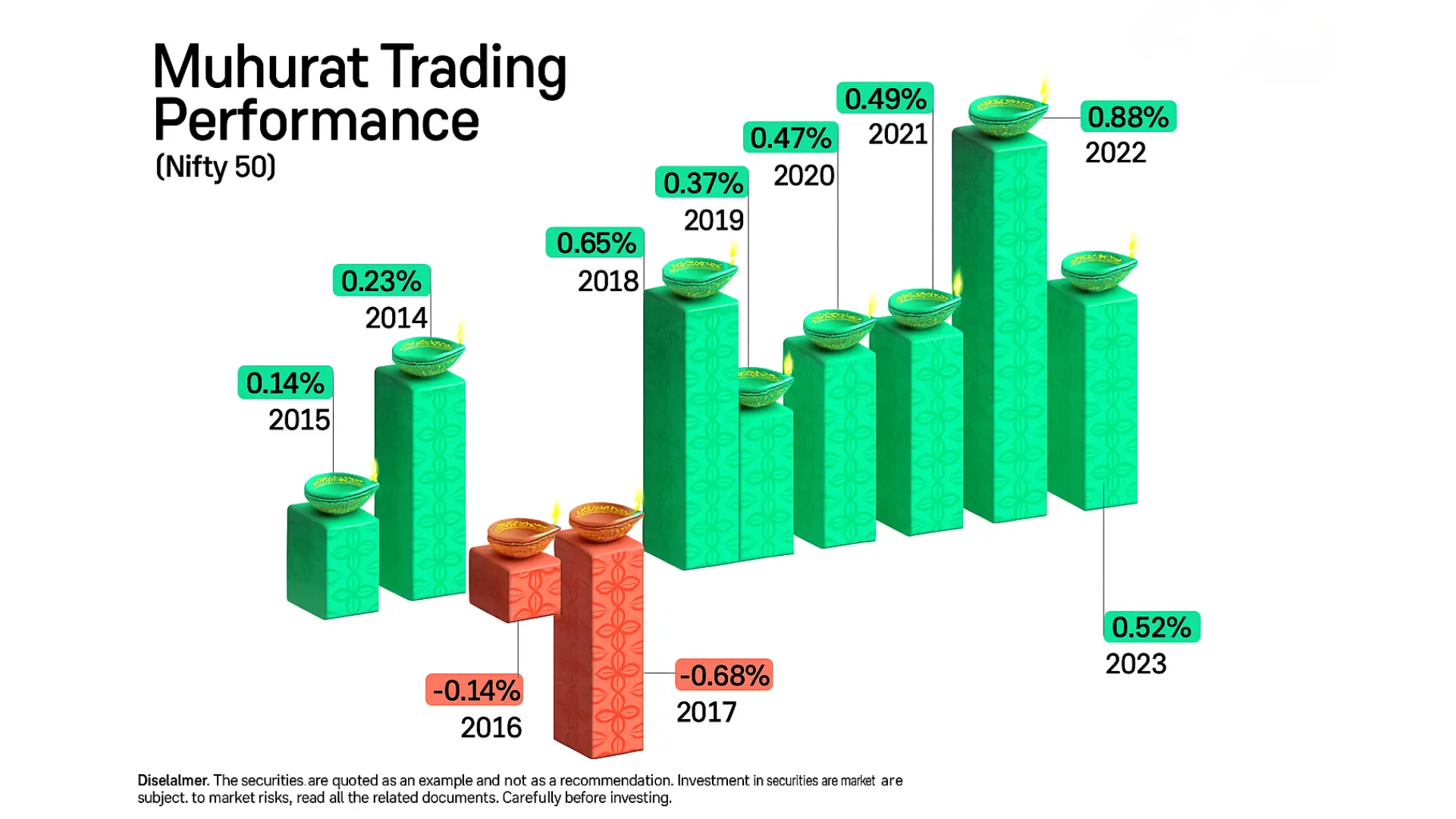Discover all the details about Muhurat Trading 2025 on October 21. Know the NSE timings, session schedule, history, and smart trading tips for Diwali.
Table of Contents
- The Significance of Muhurat Trading During Diwali
- What is Muhurat Trading?
- Muhurat Trading 2025 Date and Timings
- History of Muhurat Trading
- How Muhurat Trading Works
- Who Can Benefit from Muhurat Trading?
- Important Tips for Muhurat Trading 2025
- Final Thoughts
The Significance of Muhurat Trading During Diwali
Diwali, the festival of lights, is one of the most auspicious festivals in India. It symbolises the victory of light over darkness, wisdom over ignorance, and good over evil.
Among the many customs followed during this festival, Muhurat Trading holds a special place in the hearts of traders and investors. It’s a symbolic tradition that represents the belief that investments made during this period bring prosperity and wealth throughout the year.
What is Muhurat Trading?
The term “Muhurat” refers to an auspicious time in Hindu tradition when planetary alignments are believed to favor positive outcomes.
In the stock market, Muhurat Trading refers to a special one-hour session conducted on Diwali evening, during which investors buy and sell shares to mark the beginning of a prosperous financial year. This tradition is unique to Indian stock exchanges such as NSE (National Stock Exchange) and BSE (Bombay Stock Exchange). Many traders also perform Lakshmi Puja before investing, seeking blessings from the Goddess of Wealth.
Muhurat Trading 2025 Date and Timings
Date: Tuesday, 21 October 2025 (as per NSE)
Below are the official session timings for various market segments for Muhurat Trading 2025.
🟢 Capital Market (Equities)
| Session | Start Time | End Time | Remarks |
|---|---|---|---|
| Block Deal Session | 01:30 p.m. | 01:45 p.m. | Pre-arranged trades |
| Pre-Open Session | 01:45 p.m. | 01:53 p.m. | Price discovery phase |
| Normal Market | 01:45 p.m. | 02:45 p.m. | Main trading window (one-hour Muhurat session) |
| Closing Session | 02:45 p.m. | 02:55 p.m. | Orders at closing price / post-close actions |
| Settlement Obligation | - | - | All trades to be settled as per exchange rules |
Source: NSE | Note: Random closure may occur in the last one minute.
🟠 Futures & Options (F&O)
| Session | Start Time | End Time | Remarks |
|---|---|---|---|
| Normal Market | 01:45 p.m. | 02:45 p.m. | F&O trades allowed |
| Trade Modification | 02:45 p.m. | 02:55 p.m. | Post-trade changes permitted |
| Settlement | - | - | All trades result in settlement obligations |
Source: NSE
🔵 Currency Derivatives
| Session | Start Time | End Time | Remarks |
|---|---|---|---|
| Normal Market | 01:45 p.m. | 02:45 p.m. | Trading for currency pairs |
| Trade Modification | 02:45 p.m. | 02:55 p.m. | Final modification window |
| Settlement | - | - | Standard settlement cycle applies |
Source: NSE
🟣 Commodity Derivatives
| Session | Start Time | End Time | Remarks |
|---|---|---|---|
| Normal Market | 01:45 p.m. | 02:45 p.m. | Commodity contracts allowed |
| Position Limit / Collateral Cut-off | - | 02:55 p.m. | Position and margin finalization |
| Trade Modification | 02:45 p.m. | 02:55 p.m. | Adjustments before close |
| Settlement | - | - | All trades to be settled per exchange rules |
Source: NSE
🟡 Corporate Bonds (T+1 Settlement)
| Activity | Start Time | End Time | Remarks |
|---|---|---|---|
| Trading / Confirmation / Modification / Cancellation | 01:45 p.m. | 02:45 p.m. | Main activity window |
| Confirmation / Modification / Cancellation | 02:45 p.m. | 03:00 p.m. | Post-market operations |
| Modification / Cancellation | 03:00 p.m. | 03:15 p.m. | Final changes allowed |
Source: NSE

History of Muhurat Trading
The tradition of Muhurat Trading dates back several decades. In earlier times, stockbrokers used Diwali as the start of their new financial year, opening fresh settlement accounts during this auspicious occasion.
Key milestones:
- BSE (Bombay Stock Exchange) started Muhurat Trading in 1957.
- NSE (National Stock Exchange) began conducting Muhurat Trading in 1992.
During Diwali, brokers traditionally perform Chopda Pujan — worshipping account books for blessings. In older customs, Marwari traders often sold shares during Muhurat while Gujarati traders tended to buy. Today it is largely symbolic and cultural: a positive market ritual that signals optimism and new beginnings.
How Muhurat Trading Works
The Muhurat Trading session on Diwali typically includes multiple phases. Each phase serves a specific purpose in the brief trading window.
| Session Name | Description |
|---|---|
| Block Deal Session | Pre-agreed large trades between two parties. |
| Pre-Open Session | Market determines the equilibrium price (price discovery). |
| Normal Market | The one-hour main trading session — this is the Muhurat window. |
| Call Auction Session | Used to trade illiquid securities via auction. |
| Closing Session | Investors can place orders at the closing price or finalize positions. |
Who Can Benefit from Muhurat Trading?
The Muhurat Trading session is considered favorable for both new and experienced investors:
- Market sentiment is usually bullish during the festival due to optimism.
- New investors can make small token investments to start their investing journey.
- Seasoned traders may take advantage of higher volume and short-term volatility to execute strategies.
Although symbolic in nature, Muhurat Trading often sets a positive tone for investor sentiment and portfolio beginnings.
Important Tips for Muhurat Trading 2025
Before you participate in Diwali Muhurat Trading 2025, consider these practical tips:
- Focus on Quality Stocks: Prioritize fundamentally strong companies for long-term holdings.
- Be Ready for Volatility: With a short window, prices can move sharply — use caution.
- Use Support & Resistance Levels: Chart analysis helps in short timeframes.
- Plan Ahead: Prepare your watchlist and orders before the session starts.
- Avoid Rumours: Stick to fundamentals and avoid reacting to noisy tips.
- Settlement Awareness: All open positions at session end will carry settlement obligations.
Final Thoughts
The Muhurat Trading 2025 session on Tuesday, October 21 is a wonderful cultural opportunity to welcome prosperity and positivity into your financial life. Whether you are a first-time investor or an experienced trader, this special one-hour session symbolises hope, renewal, and the spirit of wealth creation.
Celebrate Diwali with mindful investments and a balanced approach to risk. Happy Diwali and Happy Investing!

